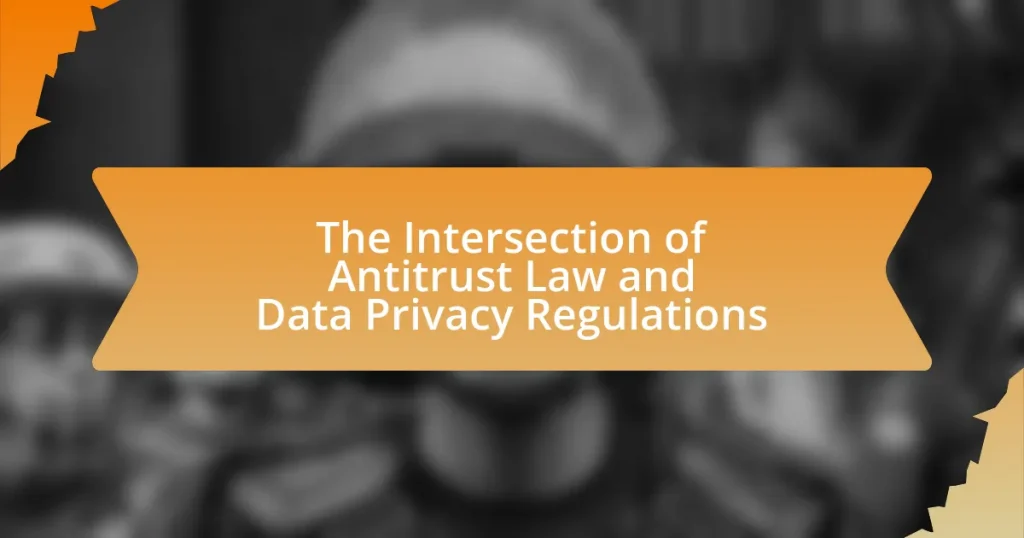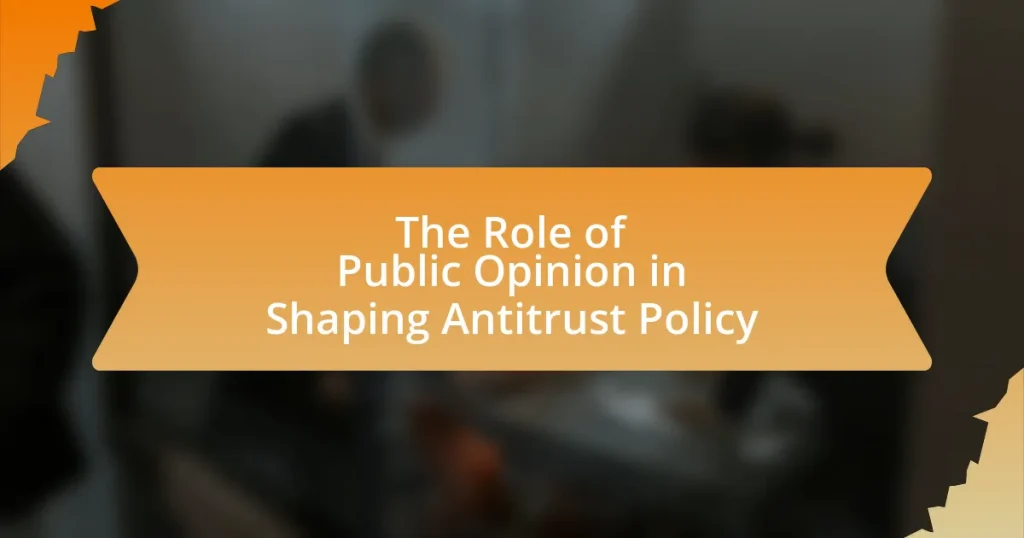State Attorneys General play a vital role in enforcing antitrust laws at both state and federal levels, aimed at protecting consumers and promoting competition. They possess the authority to investigate anti-competitive practices, initiate lawsuits, and collaborate with federal agencies, as demonstrated by their involvement in significant cases like the 2020 lawsuit against Google. This article evaluates the influence, powers, and strategies of State Attorneys General in antitrust enforcement, while also addressing the challenges they face, including resource limitations and jurisdictional issues. Additionally, it explores how they leverage public opinion and data analysis to enhance their effectiveness in safeguarding market competition.
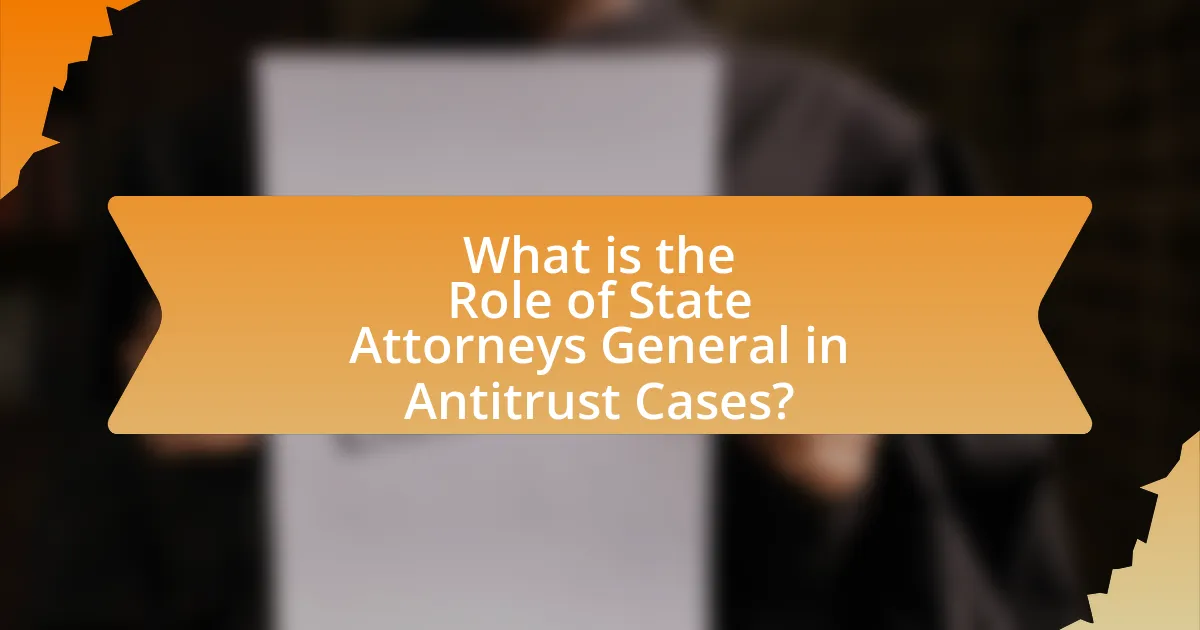
What is the Role of State Attorneys General in Antitrust Cases?
State Attorneys General play a crucial role in antitrust cases by enforcing state and federal antitrust laws to protect consumers and promote competition. They have the authority to investigate anti-competitive practices, file lawsuits against companies engaging in monopolistic behavior, and collaborate with federal agencies like the Department of Justice. For instance, in 2020, a coalition of state attorneys general led a lawsuit against Google, alleging anti-competitive practices in the digital advertising market, demonstrating their active involvement in regulating market competition and safeguarding consumer interests.
How do State Attorneys General influence antitrust enforcement?
State Attorneys General influence antitrust enforcement by initiating lawsuits, conducting investigations, and collaborating with federal agencies. They have the authority to enforce state antitrust laws, which can complement or enhance federal enforcement efforts. For example, in 2020, a coalition of State Attorneys General filed a lawsuit against Google, alleging anti-competitive practices, demonstrating their proactive role in addressing market monopolies. Additionally, State Attorneys General often coordinate with each other to amplify their impact, as seen in multi-state actions against large corporations, thereby increasing the resources and legal expertise available to challenge anti-competitive behavior effectively.
What powers do State Attorneys General have in antitrust matters?
State Attorneys General have the power to enforce state and federal antitrust laws, allowing them to investigate and prosecute anticompetitive practices. They can initiate lawsuits against companies for violations such as price-fixing, monopolization, and anti-competitive mergers. Additionally, State Attorneys General can collaborate with federal agencies like the Department of Justice and other states to address broader antitrust issues, enhancing their enforcement capabilities. This authority is rooted in both state statutes and the federal Clayton Act, which empowers states to seek injunctive relief and damages for antitrust violations.
How do State Attorneys General collaborate with federal agencies?
State Attorneys General collaborate with federal agencies primarily through joint investigations and litigation efforts in antitrust cases. This collaboration often involves sharing resources, information, and expertise to address complex legal issues that cross state and federal jurisdictions. For instance, in significant antitrust cases, State Attorneys General may work alongside the Federal Trade Commission and the Department of Justice to ensure comprehensive enforcement of competition laws, as seen in the 2020 lawsuit against Google, where multiple states joined federal efforts to challenge the company’s practices. This cooperative approach enhances the effectiveness of legal actions and promotes a unified stance against anti-competitive behavior.
Why are State Attorneys General important in antitrust litigation?
State Attorneys General are important in antitrust litigation because they serve as key enforcers of state and federal antitrust laws, protecting consumers and promoting competition. Their involvement allows for a broader enforcement landscape, as they can initiate lawsuits independently or collaborate with federal agencies, such as the Department of Justice. For instance, in 2020, a coalition of State Attorneys General successfully challenged Google’s market dominance, highlighting their capacity to address anti-competitive practices effectively. This dual enforcement mechanism enhances accountability and can lead to more comprehensive remedies for anti-competitive behavior, ultimately benefiting consumers and the economy.
What unique perspectives do State Attorneys General bring to antitrust cases?
State Attorneys General bring a localized understanding of market dynamics and consumer behavior to antitrust cases. Their unique perspectives stem from their role as representatives of state interests, allowing them to identify and address antitrust issues that may disproportionately affect local consumers and businesses. For instance, they can leverage state-specific economic data and consumer complaints to inform their legal strategies, which can differ from federal approaches. This localized focus enables them to pursue cases that reflect the specific needs and concerns of their constituents, as seen in cases like the multistate lawsuit against Google in 2020, where various states highlighted distinct competitive harms in their markets.
How do State Attorneys General address consumer protection in antitrust issues?
State Attorneys General address consumer protection in antitrust issues by enforcing state antitrust laws and collaborating with federal agencies. They investigate anti-competitive practices, file lawsuits against companies engaging in monopolistic behavior, and advocate for consumer rights. For example, in 2020, a coalition of State Attorneys General filed a lawsuit against Google, alleging anti-competitive practices that harmed consumers and stifled competition. This action illustrates their proactive role in safeguarding consumer interests and promoting fair market practices.
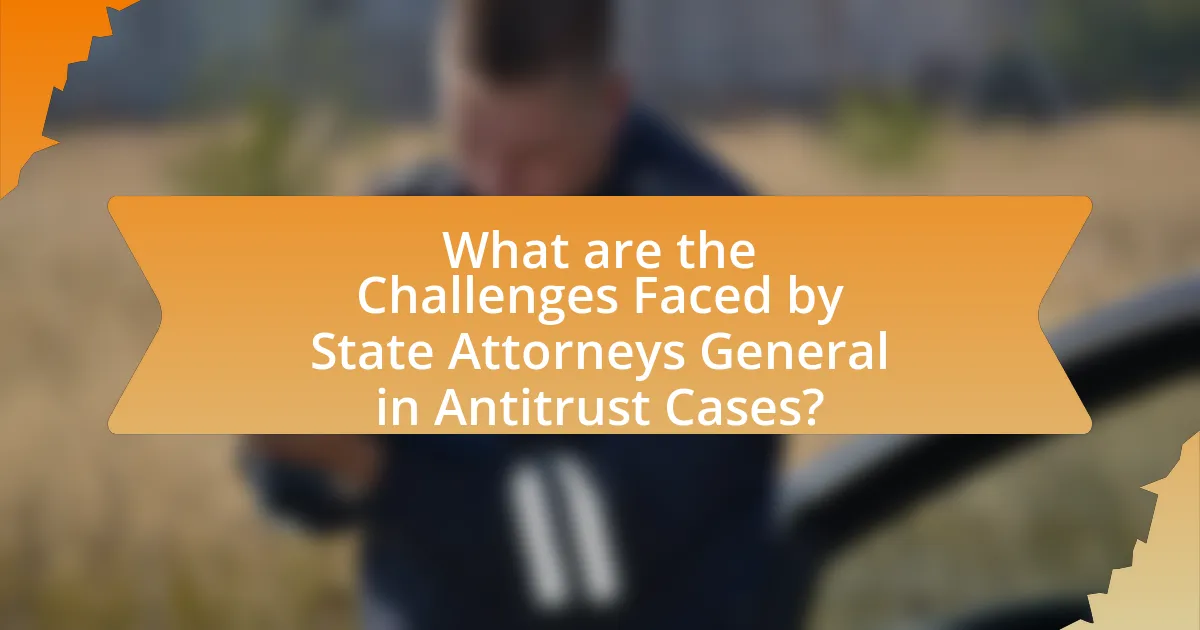
What are the Challenges Faced by State Attorneys General in Antitrust Cases?
State Attorneys General face several challenges in antitrust cases, including limited resources, jurisdictional constraints, and the complexity of legal frameworks. Limited resources hinder their ability to conduct thorough investigations and litigation, as many state offices operate with smaller budgets compared to federal agencies. Jurisdictional constraints can complicate enforcement actions, particularly when dealing with multi-state or national corporations, as they must navigate varying state laws and regulations. Additionally, the complexity of antitrust laws, which require a deep understanding of economic principles and market dynamics, poses a significant challenge in building strong cases. These factors collectively impact the effectiveness of State Attorneys General in pursuing antitrust enforcement.
What legal hurdles do State Attorneys General encounter?
State Attorneys General encounter several legal hurdles, including jurisdictional limitations, resource constraints, and the need to navigate complex federal laws. Jurisdictional limitations can restrict their ability to pursue cases that cross state lines or involve federal entities, as seen in cases where state laws conflict with federal regulations. Resource constraints often hinder their capacity to conduct thorough investigations and litigate effectively, particularly against well-funded corporations. Additionally, the necessity to comply with intricate federal antitrust laws, such as the Sherman Act and the Clayton Act, complicates their enforcement efforts, as they must align state actions with federal standards while also addressing unique state interests.
How do resource limitations affect their ability to pursue cases?
Resource limitations significantly hinder the ability of state attorneys general to pursue antitrust cases. Limited financial resources restrict the hiring of expert staff, conducting thorough investigations, and engaging in extensive litigation, which are essential for effectively challenging anti-competitive practices. For instance, a report by the National Association of Attorneys General indicates that many state offices operate with budgets that are a fraction of those available to federal agencies, resulting in fewer cases being pursued and less impactful enforcement actions. This disparity in resources ultimately diminishes the effectiveness of state attorneys general in safeguarding market competition.
What role does political pressure play in their decision-making?
Political pressure significantly influences the decision-making of state attorneys general in antitrust cases. This pressure often stems from public opinion, political affiliations, and the interests of constituents, compelling attorneys general to align their actions with the expectations of their political base. For instance, in high-profile antitrust cases, such as the 2020 lawsuit against Google, state attorneys general faced pressure to act decisively to address perceived monopolistic practices, reflecting the concerns of both voters and political leaders. This dynamic illustrates how political considerations can shape legal strategies and priorities in antitrust enforcement.
How do State Attorneys General navigate jurisdictional issues?
State Attorneys General navigate jurisdictional issues by leveraging both state and federal laws to assert their authority in antitrust cases. They often collaborate with other states and federal agencies to address multi-state or national concerns, ensuring that their actions comply with the legal frameworks governing competition. For instance, the National Association of Attorneys General provides resources and guidance on jurisdictional matters, enabling state officials to effectively coordinate their efforts. This approach is validated by historical instances where state attorneys general have successfully pursued cases against large corporations, demonstrating their ability to operate within complex jurisdictional landscapes while protecting consumer interests.
What challenges arise from differing state laws on antitrust?
Differing state laws on antitrust create challenges such as inconsistent enforcement and regulatory uncertainty for businesses operating across multiple states. This inconsistency can lead to confusion regarding compliance, as companies must navigate varying legal standards and interpretations of antitrust principles. For instance, some states may have more stringent laws than federal regulations, resulting in potential legal conflicts and increased litigation costs. Additionally, the lack of uniformity can hinder effective collaboration among state attorneys general, complicating multi-state investigations and enforcement actions. These challenges ultimately impact market competition and consumer protection, as businesses may struggle to adapt to the diverse legal landscape.
How do they manage multi-state litigation effectively?
State Attorneys General manage multi-state litigation effectively by coordinating efforts through established communication channels and collaborative frameworks. They utilize task forces to streamline information sharing, align legal strategies, and consolidate resources, which enhances efficiency and consistency across jurisdictions. For instance, the National Association of Attorneys General (NAAG) facilitates collaboration among states, allowing them to share best practices and legal insights, thereby improving the overall effectiveness of multi-state litigation efforts.
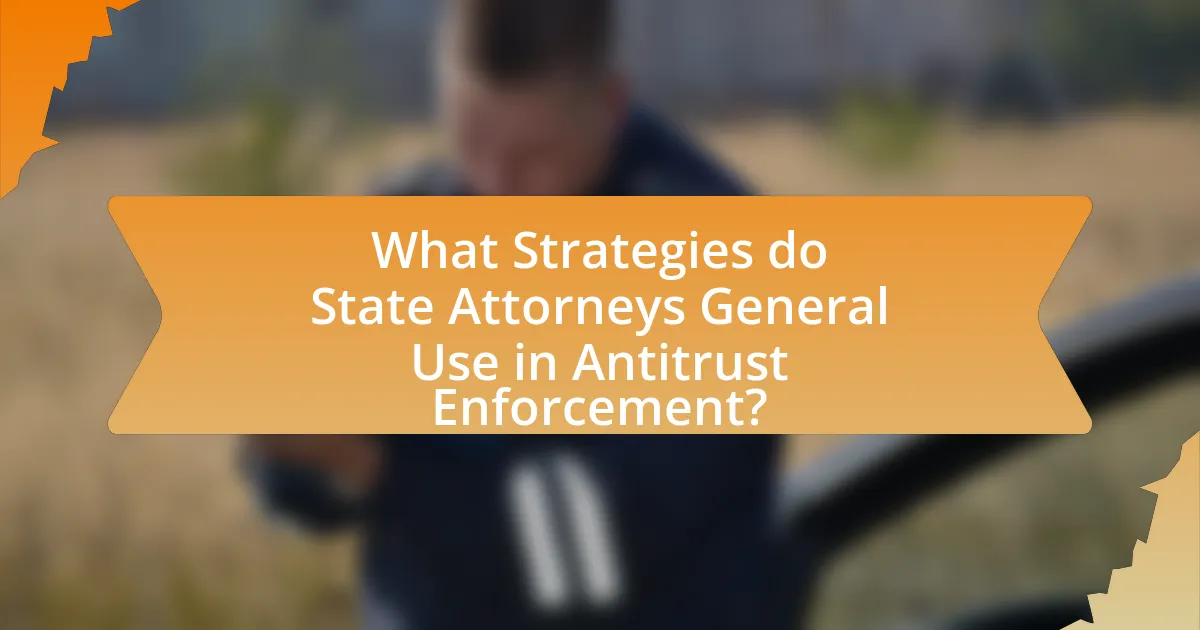
What Strategies do State Attorneys General Use in Antitrust Enforcement?
State Attorneys General employ various strategies in antitrust enforcement, including litigation, collaboration with federal agencies, and public advocacy. Litigation involves filing lawsuits against companies to challenge anti-competitive practices, as seen in cases like the 2020 lawsuit against Google for monopolistic behavior. Collaboration with federal agencies, such as the Department of Justice, allows State Attorneys General to combine resources and expertise, enhancing the effectiveness of enforcement actions. Public advocacy includes raising awareness about antitrust issues and promoting consumer rights, which can influence policy and legislative changes. These strategies collectively aim to protect competition and consumer interests in the marketplace.
How do State Attorneys General prioritize cases?
State Attorneys General prioritize cases based on factors such as the severity of the issue, potential harm to consumers, and the availability of resources. They assess the impact of cases on public interest, focusing on those that address significant violations of law or consumer protection. For instance, cases involving large-scale fraud or antitrust violations are often prioritized due to their broader implications for market competition and consumer welfare. Additionally, State Attorneys General may consider the likelihood of successful litigation and the alignment of cases with their office’s strategic goals, ensuring efficient use of limited resources.
What criteria do they use to select antitrust cases for litigation?
State Attorneys General select antitrust cases for litigation based on criteria such as the potential for significant consumer harm, the likelihood of success in court, and the ability to demonstrate clear violations of antitrust laws. They assess the market impact of the alleged anti-competitive behavior, focusing on cases that can lead to substantial remedies or deterrence against future violations. Additionally, they consider the resources available for litigation and the alignment of the case with broader enforcement priorities, ensuring that the selected cases effectively address systemic issues within the marketplace.
How do they leverage public opinion in their strategies?
State Attorneys General leverage public opinion in their strategies by actively engaging with constituents to shape their antitrust enforcement actions. They utilize public sentiment to identify key issues that resonate with voters, which helps prioritize cases that reflect the interests and concerns of the community. For instance, in high-profile antitrust cases against large corporations, State Attorneys General often conduct public forums and surveys to gauge public opinion, ensuring that their legal strategies align with the values and expectations of the electorate. This approach not only enhances their legitimacy but also mobilizes public support, as seen in the 2020 antitrust actions against Google, where widespread public concern about monopolistic practices influenced the legal framework and strategy employed by the attorneys general involved.
What tools and resources do State Attorneys General employ?
State Attorneys General employ a variety of tools and resources, including legal authority, investigative powers, and collaboration with federal agencies. They utilize statutes such as the Sherman Act and state antitrust laws to initiate investigations and lawsuits against anti-competitive practices. Additionally, they have access to expert economic analysis and data analytics tools to assess market conditions and consumer impact. Collaboration with organizations like the National Association of Attorneys General enhances their capacity to share information and strategies. These resources enable State Attorneys General to effectively enforce antitrust laws and protect consumer interests.
How do they utilize data and economic analysis in cases?
State Attorneys General utilize data and economic analysis in antitrust cases to assess market dynamics and identify anti-competitive behavior. They analyze pricing data, market shares, and consumer behavior to establish the impact of business practices on competition. For instance, in the case against Google, data on search engine market shares and advertising revenues was crucial in demonstrating monopolistic practices. Economic analysis helps quantify harm to consumers and competition, providing a solid foundation for legal arguments and potential remedies.
What partnerships do they form to enhance their enforcement efforts?
State Attorneys General form partnerships with federal agencies, such as the Federal Trade Commission (FTC) and the Department of Justice (DOJ), to enhance their enforcement efforts in antitrust cases. These collaborations allow for resource sharing, joint investigations, and coordinated legal strategies, which strengthen the overall effectiveness of antitrust enforcement. For instance, in significant cases like the antitrust action against Google, state attorneys general worked alongside the DOJ to combine expertise and leverage broader legal authority, demonstrating the impact of such partnerships on achieving regulatory goals.
What Best Practices Can State Attorneys General Follow in Antitrust Cases?
State Attorneys General can follow best practices in antitrust cases by conducting thorough investigations, collaborating with federal agencies, and engaging in public education. Thorough investigations ensure that evidence is collected systematically, which is crucial for building a strong case; for instance, the multi-state lawsuit against Google in 2020 involved extensive data analysis and consumer impact assessments. Collaboration with federal agencies, such as the Department of Justice, enhances resources and expertise, as seen in the joint efforts during the AT&T-Time Warner merger review. Engaging in public education helps inform consumers about their rights and the implications of antitrust violations, fostering transparency and community support, which was effectively demonstrated in various campaigns by state attorneys general during high-profile cases.
How can they improve collaboration with other states and federal agencies?
State Attorneys General can improve collaboration with other states and federal agencies by establishing formal communication channels and joint task forces focused on antitrust enforcement. These collaborative efforts can facilitate information sharing, resource allocation, and coordinated legal strategies, enhancing the effectiveness of antitrust actions. For instance, the Multistate Antitrust Task Force, which includes various state attorneys general, exemplifies how states can work together to address antitrust issues more efficiently. This approach not only strengthens legal frameworks but also aligns enforcement priorities across jurisdictions, leading to more comprehensive and impactful antitrust interventions.
What strategies can enhance public engagement and support?
Strategies that can enhance public engagement and support include transparent communication, community outreach initiatives, and leveraging social media platforms. Transparent communication fosters trust by providing clear information about antitrust cases and their implications for the public. Community outreach initiatives, such as town hall meetings and educational workshops, allow state attorneys general to connect directly with constituents, addressing their concerns and encouraging participation. Leveraging social media platforms enables the dissemination of information quickly and broadly, facilitating dialogue and feedback from the public. Research indicates that states with active public engagement strategies see higher levels of community support and participation in legal processes, reinforcing the effectiveness of these approaches.


